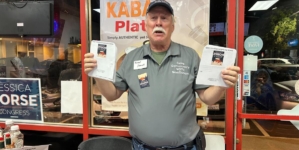-
He led a darknet drug trafficking market dubbed ‘rickandmortyshop.’ Now he’s going to prison - 20 mins ago
-
The 4 Republican Senators Matt Gaetz Believed Would Tank His AG Nomination - 25 mins ago
-
Inside the Lobbying Career of Susie Wiles, Trump’s New Chief of Staff - 26 mins ago
-
How To Watch Steelers vs Browns Without Prime, Live Stream TNF, TV Channel - about 1 hour ago
-
LAPD probe finds no truth to claims officers cheated to get promoted - about 1 hour ago
-
Bob Casey Concedes to David McCormick in Pennsylvania Senate Race - about 1 hour ago
-
How to Watch Guadalajara vs Atlas: Live Stream Liga MX, TV Channel - 2 hours ago
-
California voters approve measure aimed at restricting AIDS Healthcare Foundation spending - 2 hours ago
-
How Hostility to Immigrants Will Hurt America’s Tech Sector - 2 hours ago
-
Red Sox Predicted To Sign $156M Gold Glover, Lucas Giolito’s High School Teammate - 2 hours ago
Serial rapist and heir to Max Factor fortune won’t get early release
The California Board of Parole Hearings reversed a decision made in August to allow the early release of Andrew Stuart Luster, a serial rapist who drugged young women in college bars during the late 1990s and later was captured by a bounty hunter when he fled to Mexico to avoid his trial.
Luster, a great-grandson of cosmetics giant Max Factor, was convicted in 2003 of 86 felony counts, including poisoning, rape, sodomy and oral copulation of unconscious victims. He is now 60 years old.
In August, a two-person parole panel deemed him eligible for early release — a decision that Ventura County Dist. Atty. Erik Nasarenko believed was based on erroneous facts surrounding Luster’s offenses.
“Commissioners ignored consistent, blatant misrepresentations the inmate made about his crimes,” wrote Nasarenko in an October letter to the board. “The commissioners failed to prepare questions based on these misrepresentations and demonstrated through their questioning they were ill prepared to investigate the inmate’s lack of understanding and insight into the factors that led to his 86 felony convictions.”
The full Board of Parole Hearings panel recently reviewed a list of these alleged errors provided by Nasarenko and reversed the parole decision. Luster is tentatively scheduled for another parole hearing in 2025.
Senior Deputy District Attorney Tony Wold, who prosecuted the original case against Luster, said it is the intent of the Ventura County District Attorney’s Office to ensure he serves the remaining two years of his term behind bars.
“In my 27 years as a prosecutor, Luster remains one of the most dangerous rapists I have ever prosecuted,” Wold said in a statement.
If he is not paroled sooner, Luster is scheduled to be released on Oct. 31, 2026.
From 1996 to 2000 Luster used the illegal drug gamma-hydroxybutyrate, or GHB, to put his victims in a “life-threatening state of unconsciousness” and engage in “sadistic sexual abuse of their comatose bodies,” according to the D.A.’s Office. Footage that Luster recorded of two of these rapes was used against him in court.
The case attracted intense media attention when Luster fled to Mexico after paying a $1-million bail in 2003 and was subsequently captured in Puerto Vallarta by American bounty hunter and reality TV personality Duane “Dog” Chapman.
While in Mexico, Luster compiled what he called a “payback list,” with names of Ventura County prosecutors, sheriff’s deputies, his victims and one of his attorneys, according to statements by Judge Kathryne Ann Stoltz.
Luster was sentenced to 124 years in prison in 2003; however, in 2013 that sentence was reduced to 50 years. He has since served 23 of those years, including time spent under house arrest and in pretrial custody, according to the D.A.’s Office.
In California, the general rule is that a defendant convicted of a nonviolent felony must serve 50% of their sentence. Luster’s crime, rape of an unconscious person, technically qualifies as a nonviolent offense, Nasarenko explained to KCLU in 2023.
Source link


















